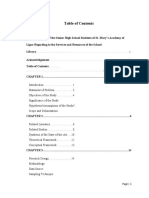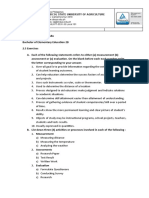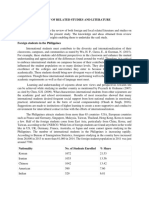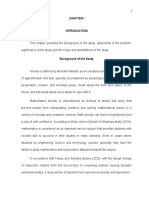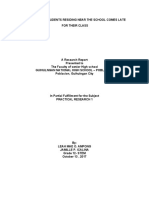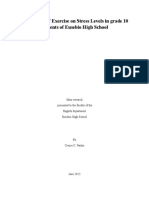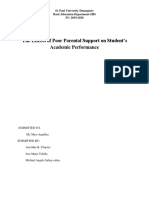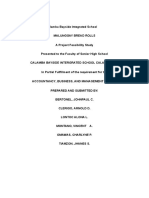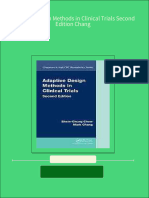0 ratings0% found this document useful (0 votes)
1K viewsTeacher Quality in The Philippines
Teacher Quality in The Philippines
Uploaded by
Jesieca BulauanThe Philippine Professional Standards for Teachers defines teacher quality in the Philippines according to 7 domains that describe the knowledge, skills, and characteristics teachers are expected to demonstrate. The standards reflect the increasing sophistication expected of teachers across different teaching situations and aim to ensure teachers can facilitate quality education through learner-centered practices, content mastery, and continuous professional development and improvement.
Copyright:
© All Rights Reserved
Available Formats
Download as DOCX, PDF, TXT or read online from Scribd
Teacher Quality in The Philippines
Teacher Quality in The Philippines
Uploaded by
Jesieca Bulauan0 ratings0% found this document useful (0 votes)
1K views3 pagesThe Philippine Professional Standards for Teachers defines teacher quality in the Philippines according to 7 domains that describe the knowledge, skills, and characteristics teachers are expected to demonstrate. The standards reflect the increasing sophistication expected of teachers across different teaching situations and aim to ensure teachers can facilitate quality education through learner-centered practices, content mastery, and continuous professional development and improvement.
Original Title
Untitled
Copyright
© © All Rights Reserved
Available Formats
DOCX, PDF, TXT or read online from Scribd
Share this document
Did you find this document useful?
Is this content inappropriate?
The Philippine Professional Standards for Teachers defines teacher quality in the Philippines according to 7 domains that describe the knowledge, skills, and characteristics teachers are expected to demonstrate. The standards reflect the increasing sophistication expected of teachers across different teaching situations and aim to ensure teachers can facilitate quality education through learner-centered practices, content mastery, and continuous professional development and improvement.
Copyright:
© All Rights Reserved
Available Formats
Download as DOCX, PDF, TXT or read online from Scribd
Download as docx, pdf, or txt
0 ratings0% found this document useful (0 votes)
1K views3 pagesTeacher Quality in The Philippines
Teacher Quality in The Philippines
Uploaded by
Jesieca BulauanThe Philippine Professional Standards for Teachers defines teacher quality in the Philippines according to 7 domains that describe the knowledge, skills, and characteristics teachers are expected to demonstrate. The standards reflect the increasing sophistication expected of teachers across different teaching situations and aim to ensure teachers can facilitate quality education through learner-centered practices, content mastery, and continuous professional development and improvement.
Copyright:
© All Rights Reserved
Available Formats
Download as DOCX, PDF, TXT or read online from Scribd
Download as docx, pdf, or txt
You are on page 1of 3
The Philippine Professional Standards for Teachers, which is built on NCBTS,
complements the reform initiatives on teacher quality from pre-service education
to in-service training. It articulates what constitutes teacher quality in the K to 12
Reform through well-defined domains, strands, and indicators that provide
measures of professional learning, competent practice, and effective
engagement. This set of standards makes explicit what teachers should know, be
able to do and value to achieve competence, improved student learning
outcomes, and eventually quality education. It is founded on teaching
philosophies of learner-centeredness, lifelong learning, and
inclusivity/inclusiveness, among others. The professional standards, therefore,
become a public statement of professional accountability that can help teachers
reflect on and assess their own practices as they aspire for personal growth and
professional development.
Teacher quality in the Philippines
The Philippine Professional Standards for Teachers defines teacher quality in the
Philippines. The standards describe the expectations of teachers’ increasing levels
of knowledge, practice and professional engagement. At the same time, the
standards allow for teachers’ growing understanding, applied with increasing
sophistication across a broader and more complex range of teaching/learning
situations.
The following describes the breadth of 7 Domains that are required by teachers
to be effective in the 21st Century in the Philippines. Quality teachers in the
Philippines need to possess the following characteristics:
recognize the importance of mastery of content knowledge and its
interconnectedness within and across curriculum areas, coupled with a
sound and critical understanding of the application of theories and
principles of teaching and learning. They apply developmentally
appropriate and meaningful pedagogy grounded on content knowledge
and current research. They display proficiency in Mother Tongue, Filipino
and English to facilitate the teaching and learning process, as well as
exhibit the needed skills in the use of communication strategies, teaching
strategies and technologies to promote high-quality learning outcomes.
provide learning environments that are safe, secure, fair and supportive in
order to promote learner responsibility and achievement. They create an
environment that is learning-focused and they efficiently manage learner
behavior in a physical and virtual space. They utilize a range of resources
and provide intellectually challenging and stimulating activities to
encourage constructive classroom interactions geared towards the
attainment of high standards of learning.
establish learning environments that are responsive to learner diversity.
They respect learners’ diverse characteristics and experiences as inputs to
the planning and design of learning opportunities. They encourage the
celebration of diversity in the classroom and the need for teaching
practices that are differentiated to encourage all learners to be successful
citizens in a changing local and global environment.
interact with the national and local curriculum requirements. They translate
curriculum content into learning activities that are relevant to learners and
based on the principles of effective teaching and learning. They apply their
professional knowledge to plan and design, individually or in collaboration
with colleagues, well-structured and sequenced lessons that are
contextually relevant, responsive to learners’ needs and incorporate a
range of teaching and learning resources. They communicate learning
goals to support learner participation, understanding and achievement.
apply a variety of assessment tools and strategies in monitoring,
evaluating, documenting and reporting learners’ needs, progress and
achievement. They use assessment data in a variety of ways to inform and
enhance the teaching and learning process and programs. They provide
learners with the necessary feedback about learning outcomes that informs
the reporting cycle and enables teachers to select, organize and use sound
assessment processes.
establish school-community partnerships aimed at enriching the learning
environment, as well as the community’s engagement in the educative
process. They identify and respond to opportunities that link teaching and
learning in the classroom to the experiences, interests and aspirations of
the wider school community and other key stakeholders. They understand
and fulfill their obligations in upholding professional ethics, accountability
and transparency to promote professional and harmonious relationships
with learners, parents, schools and the wider community.
value personal growth and professional development and exhibit high
personal regard for the profession by maintaining qualities that uphold the
dignity of teaching such as caring attitude, respect and integrity. They
value personal and professional reflection and learning to improve their
practice. They assume responsibility for personal growth and professional
development for lifelong learning.
You might also like
- Supervisory Plan 2022 2023Document4 pagesSupervisory Plan 2022 2023Jesieca Bulauan100% (15)
- The Secret Language of Your Name - Ch. 1Document26 pagesThe Secret Language of Your Name - Ch. 1Beyond Words Publishing92% (36)
- Reflective EssayDocument14 pagesReflective Essaycristele ann docaboNo ratings yet
- 250 Word Essay For Statistics and ProbabilityDocument1 page250 Word Essay For Statistics and ProbabilitySam Depona100% (1)
- Mill Material Balance-BOOK-Toat PDFDocument62 pagesMill Material Balance-BOOK-Toat PDFKeziaagus Hia100% (1)
- Days With Michel Conge, Part One, by Rami Kalfon - Parabola EssayDocument9 pagesDays With Michel Conge, Part One, by Rami Kalfon - Parabola EssaySaul Luas100% (1)
- Arcturus Speaks Oracle Cards GuidebookDocument80 pagesArcturus Speaks Oracle Cards GuidebookLorena Bruno100% (3)
- B14200982S1119 TVL RelstudyDocument8 pagesB14200982S1119 TVL RelstudyROSALINDA LATONo ratings yet
- Presentation, Analysis and Interpretation of Data: 1st SemesterDocument6 pagesPresentation, Analysis and Interpretation of Data: 1st SemesterRonnie Serrano Pueda100% (1)
- Perceived Challenges in Senior High School Tvl-Food Technology Classes in Dadasantri Sub-Congressional Ditrict of BoholDocument16 pagesPerceived Challenges in Senior High School Tvl-Food Technology Classes in Dadasantri Sub-Congressional Ditrict of Boholchristine galleto0% (1)
- Lesson 3 PathfitDocument16 pagesLesson 3 PathfitYeyeng AlmazanNo ratings yet
- The Relationship Between Students' Interest Towards Mathematics and Performance Among Grade-11 StudentsDocument37 pagesThe Relationship Between Students' Interest Towards Mathematics and Performance Among Grade-11 StudentsDecere PascualNo ratings yet
- Success Stories of Distinguished Teachers of CapizDocument19 pagesSuccess Stories of Distinguished Teachers of CapizPsychology and Education: A Multidisciplinary JournalNo ratings yet
- Agusan Del Sur State College of Agreculture and TechnologyDocument19 pagesAgusan Del Sur State College of Agreculture and TechnologyrichmondgregoreNo ratings yet
- The K To 12 Program Covers Kindergarten and 12 Years of Basic EducationDocument3 pagesThe K To 12 Program Covers Kindergarten and 12 Years of Basic EducationJohn AxelNo ratings yet
- Week 2 Philipiine Contemporary ArtsDocument11 pagesWeek 2 Philipiine Contemporary ArtsCristel Anne A. LlamadorNo ratings yet
- Eapp (Act 4&5)Document3 pagesEapp (Act 4&5)aubrey jasmira lopezNo ratings yet
- Satisfaction Rate of The Senior High School Students Regarding To The Services and Resources of The LibraryDocument48 pagesSatisfaction Rate of The Senior High School Students Regarding To The Services and Resources of The Librarykarylle jhane tanguinNo ratings yet
- Section 2 Professional Teachers Are Competent Chapter 4Document29 pagesSection 2 Professional Teachers Are Competent Chapter 4Carmelli Ann GallardoNo ratings yet
- Orca Share Media1601452814528 6716979945787847166Document3 pagesOrca Share Media1601452814528 6716979945787847166April Jeannelyn Feniza100% (4)
- Impact of Wrong Course Choice On The Students' Academic Performance and Psychological Health and The Factors Influencing Students' DecisionDocument15 pagesImpact of Wrong Course Choice On The Students' Academic Performance and Psychological Health and The Factors Influencing Students' DecisionHanz Amithy Ness PanesNo ratings yet
- Factors Influencing The Career Choices Among of Grade 12 AccountancyDocument25 pagesFactors Influencing The Career Choices Among of Grade 12 AccountancysamanthakatefloresfernandezNo ratings yet
- 2.5 ExercisesDocument7 pages2.5 ExercisesMeriam CarulloNo ratings yet
- Reading and WritingDocument1 pageReading and WritingJaylanie Evangelista50% (2)
- Review of Related Studies and LiteratureDocument9 pagesReview of Related Studies and LiteratureMaria Yvonne Araneta100% (1)
- Chapter 1 To 5Document49 pagesChapter 1 To 5Emman SanoNo ratings yet
- Evaluating The Relationship of Immersion Program and Course Selection Aspirations of SHS Students in NSNUDocument84 pagesEvaluating The Relationship of Immersion Program and Course Selection Aspirations of SHS Students in NSNUghost.aleqNo ratings yet
- The Influenced of School Advertisement in Choosing School For Senior High School ProgramDocument6 pagesThe Influenced of School Advertisement in Choosing School For Senior High School ProgramJaysan SacbibitNo ratings yet
- Updated PR2Document32 pagesUpdated PR2Lawrence ZowwNo ratings yet
- Aspiration and Readiness of Filipino Senior High SDocument10 pagesAspiration and Readiness of Filipino Senior High SJackie-Lou Lopez CariñoNo ratings yet
- PR1 11-DescartesDocument8 pagesPR1 11-DescartesKeij AlolosanNo ratings yet
- 12 STEM Group 1 Xyz 4 Ready For PrintingDocument21 pages12 STEM Group 1 Xyz 4 Ready For PrintingMary Rose DomingoNo ratings yet
- Chapter IDocument24 pagesChapter IHoney Grace Salcedo AghonNo ratings yet
- Mount Carmel College Baler, Aurora Integrated Basic Education Department Senior High School Level S.Y. 2019-2020 AcknowledgmentDocument5 pagesMount Carmel College Baler, Aurora Integrated Basic Education Department Senior High School Level S.Y. 2019-2020 AcknowledgmentReabels FranciscoNo ratings yet
- Assessment: Let Us See What You Have Got!Document2 pagesAssessment: Let Us See What You Have Got!Christine Nathalie BalmesNo ratings yet
- Chapter I The Problem and The Review of LiteratureDocument4 pagesChapter I The Problem and The Review of LiteratureYu KandaNo ratings yet
- Grade 12 Research Paper 2Document43 pagesGrade 12 Research Paper 2Aira FundadorNo ratings yet
- SIGNIFICANCE CyberbullyingDocument1 pageSIGNIFICANCE CyberbullyingDanish MagallanesNo ratings yet
- Cooperative Learning Strategy and Its Effect On The Academic Performance in Technology and Livelihood EducationDocument8 pagesCooperative Learning Strategy and Its Effect On The Academic Performance in Technology and Livelihood EducationSuzette Lumbres100% (2)
- Lit EssayDocument2 pagesLit EssayextraordinarymgNo ratings yet
- Word Problem Stat ZtestDocument6 pagesWord Problem Stat ZtestJohnmark LiboonNo ratings yet
- Final PapaerDocument23 pagesFinal PapaerAlexandriteNo ratings yet
- Findings, Conclusion, and RecommendationsDocument3 pagesFindings, Conclusion, and Recommendationscathleen AbilaNo ratings yet
- Grade 11 UcspDocument4 pagesGrade 11 Ucspmarlon anzanoNo ratings yet
- Senior High School To Be Abolished or Not - 1Document2 pagesSenior High School To Be Abolished or Not - 1J A Y ENo ratings yet
- The Impact of Exercise On Stress Levels in Grade 10 Students of Eusebio High SchoolDocument8 pagesThe Impact of Exercise On Stress Levels in Grade 10 Students of Eusebio High SchoolCeejee PaulinNo ratings yet
- Chapter 2 Gas ResearchDocument8 pagesChapter 2 Gas ResearchGirielynPoLaguismaNo ratings yet
- Monsanto - PR2Document9 pagesMonsanto - PR2Sir Jr100% (1)
- Lesson 28 - Simple Annuities (Periodic Payment)Document9 pagesLesson 28 - Simple Annuities (Periodic Payment)April Joy Lascuña100% (1)
- ACTIVITY: Here Is The Quick and Simple Test (Simple Test For Dominant Learning Style) To FindDocument8 pagesACTIVITY: Here Is The Quick and Simple Test (Simple Test For Dominant Learning Style) To Findkaren grace salatan100% (1)
- Sample Work Immersion Portfo IIIDocument17 pagesSample Work Immersion Portfo IIILourdes MataNo ratings yet
- Chapter 3 MethodologyDocument3 pagesChapter 3 MethodologyRaven Dela Fuente100% (1)
- The Effects of Poor Parental Support On Student's Academic PerformanceDocument4 pagesThe Effects of Poor Parental Support On Student's Academic PerformancegalelavNo ratings yet
- Analysis of The Movie Every Child Is SpeDocument24 pagesAnalysis of The Movie Every Child Is SpeLey Anne PaleNo ratings yet
- Practical Research IDocument180 pagesPractical Research INoelyn GalindezNo ratings yet
- FINAL 24 Bridging The Gap Between K 12 Graduates and Employment Final 0921042 20210903Document8 pagesFINAL 24 Bridging The Gap Between K 12 Graduates and Employment Final 0921042 20210903Carylle Joy SalindayaoNo ratings yet
- Blah BlahDocument21 pagesBlah BlahKier Nadela LatonioNo ratings yet
- UCSP Module 1Document124 pagesUCSP Module 1Sandra Penalba BinateroNo ratings yet
- RESEARCH Chapters 1 To 3Document18 pagesRESEARCH Chapters 1 To 3Mariela ReyesNo ratings yet
- Chapter 1Document20 pagesChapter 1Geoana Jane BadenasNo ratings yet
- My Reflection To The Movie "The Miracle Worker"Document4 pagesMy Reflection To The Movie "The Miracle Worker"Egielyn SisterNo ratings yet
- ACTIVITY 1 PhiloDocument2 pagesACTIVITY 1 PhiloColeen gaboyNo ratings yet
- Pilar of Mindanao: A Story of Courage and Love in World War IiFrom EverandPilar of Mindanao: A Story of Courage and Love in World War IiNo ratings yet
- The NCBTSDocument2 pagesThe NCBTSJesieca BulauanNo ratings yet
- Vi. Voluntary Work or Involvement in Civic / Non-Government / People / Voluntary Organization/SDocument1 pageVi. Voluntary Work or Involvement in Civic / Non-Government / People / Voluntary Organization/SJesieca BulauanNo ratings yet
- Nelia Z. Anguluan, PHD: Susan Marie P. Bartolome, PHDDocument1 pageNelia Z. Anguluan, PHD: Susan Marie P. Bartolome, PHDJesieca BulauanNo ratings yet
- Marungko KGDocument19 pagesMarungko KGJesieca BulauanNo ratings yet
- English 3-Q4-L4 ModuleDocument19 pagesEnglish 3-Q4-L4 ModuleJesieca Bulauan100% (2)
- English 3-Q4-L5 ModuleDocument11 pagesEnglish 3-Q4-L5 ModuleJesieca Bulauan100% (1)
- Q3 Periodical Test in English 1Document8 pagesQ3 Periodical Test in English 1Jesieca Bulauan100% (2)
- English 3-Q4-L3 ModuleDocument14 pagesEnglish 3-Q4-L3 ModuleJesieca BulauanNo ratings yet
- Entrance of The Completer: Opening RemarksDocument3 pagesEntrance of The Completer: Opening RemarksJesieca BulauanNo ratings yet
- Closing Remarks-ChristmasDocument1 pageClosing Remarks-ChristmasJesieca Bulauan80% (5)
- script-7TH BDAYDocument3 pagesscript-7TH BDAYJesieca Bulauan100% (2)
- UntitledDocument1 pageUntitledJesieca BulauanNo ratings yet
- Week 3 - Accomplishment ReportDocument3 pagesWeek 3 - Accomplishment ReportJesieca BulauanNo ratings yet
- Speech Grad Mam NitaDocument2 pagesSpeech Grad Mam NitaJesieca BulauanNo ratings yet
- The NCBTSDocument2 pagesThe NCBTSJesieca BulauanNo ratings yet
- 2september 2021-Accomplishment ReportDocument2 pages2september 2021-Accomplishment ReportJesieca BulauanNo ratings yet
- 5december 2021-Accomplishment ReportDocument2 pages5december 2021-Accomplishment ReportJesieca BulauanNo ratings yet
- Schools Division Office of IsabelaDocument7 pagesSchools Division Office of IsabelaJesieca BulauanNo ratings yet
- Advance Montessori Education Center of Isabela, Inc.: EmailDocument3 pagesAdvance Montessori Education Center of Isabela, Inc.: EmailJesieca BulauanNo ratings yet
- WEEKLY Supervisory Plan New 22Document7 pagesWEEKLY Supervisory Plan New 22Jesieca BulauanNo ratings yet
- English1 Q3 Module5A UsingPoliteExpressioninGreetings Version6Document22 pagesEnglish1 Q3 Module5A UsingPoliteExpressioninGreetings Version6Jesieca BulauanNo ratings yet
- CD 9 Supervisory Plan 2020 2021 1Document7 pagesCD 9 Supervisory Plan 2020 2021 1Jesieca BulauanNo ratings yet
- English1 Q3 Mod4H DiscussingIllustratingandDramatizingSpecificEvents V1.2Document20 pagesEnglish1 Q3 Mod4H DiscussingIllustratingandDramatizingSpecificEvents V1.2Jesieca BulauanNo ratings yet
- Q3 English1 Mod4D IdentifyingCauseandEffectofEventsThroughListeningtoShortStories V2.0Document18 pagesQ3 English1 Mod4D IdentifyingCauseandEffectofEventsThroughListeningtoShortStories V2.0Jesieca BulauanNo ratings yet
- SESSION GUIDE ONLINE REGIONAL UPSKILLING OF KEY STAGE 1 TEACHERS IN DESIGN TEACHING AND SCIENCE AND MATHEMATICS TEACHIN Jessica FINAL 1Document9 pagesSESSION GUIDE ONLINE REGIONAL UPSKILLING OF KEY STAGE 1 TEACHERS IN DESIGN TEACHING AND SCIENCE AND MATHEMATICS TEACHIN Jessica FINAL 1Jesieca BulauanNo ratings yet
- English1 Q3 Mod4A NotingImportantDetailsDocument20 pagesEnglish1 Q3 Mod4A NotingImportantDetailsJesieca Bulauan100% (1)
- Thesis Synopsis Rohit GargDocument15 pagesThesis Synopsis Rohit GargrohitNo ratings yet
- Engineering Mechanics: School of Civil, Environmental and Sanitary Engineering (Scege)Document11 pagesEngineering Mechanics: School of Civil, Environmental and Sanitary Engineering (Scege)Justin RiveraNo ratings yet
- 2017 Scig8q1Document190 pages2017 Scig8q1richardsamrano33% (3)
- Thesis Statement Why We Crave Horror MoviesDocument4 pagesThesis Statement Why We Crave Horror Moviesvxjtklxff100% (2)
- KWV 12 Physcs Work Energy and Power NotesDocument9 pagesKWV 12 Physcs Work Energy and Power NotesradisegoanedialeNo ratings yet
- Advertisement For The Teaching Staff in DOHA, Qatar - 1 PDFDocument1 pageAdvertisement For The Teaching Staff in DOHA, Qatar - 1 PDF하룬아완No ratings yet
- Unit 3 tiếng anh 12 ways of socializingDocument14 pagesUnit 3 tiếng anh 12 ways of socializingthanhhoa021214No ratings yet
- Life Cycle of A Butterfly Station Lesson PlanDocument2 pagesLife Cycle of A Butterfly Station Lesson PlanElaine SpanoNo ratings yet
- ER-5000 Symons Rescon 304 2008Document5 pagesER-5000 Symons Rescon 304 2008Edwin RamirezNo ratings yet
- Ebooks File Adaptive Design Methods in Clinical Trials Second Edition Chang All ChaptersDocument84 pagesEbooks File Adaptive Design Methods in Clinical Trials Second Edition Chang All Chapterssawudesethia100% (13)
- Causa Finalis: Main ArticleDocument4 pagesCausa Finalis: Main ArticleNoemi NadadoNo ratings yet
- Thin Film Growth - MBE PDFDocument24 pagesThin Film Growth - MBE PDFnuemoonNo ratings yet
- Chemistry of Fragnance-1Document22 pagesChemistry of Fragnance-1naitikrajtiwari587No ratings yet
- Immediate download What is this Thing Called Metaethics 2nd Edition Matthew Chrisman ebooks 2024Document82 pagesImmediate download What is this Thing Called Metaethics 2nd Edition Matthew Chrisman ebooks 2024habulmesang7100% (2)
- SHS Humss Ucsp Q1 WK4Document6 pagesSHS Humss Ucsp Q1 WK4Edelweiss 27100% (1)
- Field Study 1-Episode 6Document6 pagesField Study 1-Episode 6chuboy gonzagaNo ratings yet
- Pol 111Document178 pagesPol 111Olatunji MosesNo ratings yet
- Memos 2Document3 pagesMemos 2api-508715281No ratings yet
- Mackenzie_N_M_and_Knipe_S_2006_Research ParadigmsDocument13 pagesMackenzie_N_M_and_Knipe_S_2006_Research ParadigmsRashel ten HolderNo ratings yet
- Methods of Fuzzy Pattern RecognitionDocument8 pagesMethods of Fuzzy Pattern RecognitionSaptadwipa RakshitNo ratings yet
- Practice Test No. 17: (Adapted From Reading Challenge 1 by Casey Malareher and Andrea Janzen)Document4 pagesPractice Test No. 17: (Adapted From Reading Challenge 1 by Casey Malareher and Andrea Janzen)nguyen ngaNo ratings yet
- Shaywitz Et Al (2002) fMRI DyslexiaDocument10 pagesShaywitz Et Al (2002) fMRI Dyslexiacristinarodrigues80No ratings yet
- SEMI-DETAILED 5es LESSON PLAN Math - RosalemDocument3 pagesSEMI-DETAILED 5es LESSON PLAN Math - RosalemRizamae Galve RosalemNo ratings yet
- ADM-SHS-StatProb-Q3-M5-Computing Probability Corresponding To A Given Random VariableDocument27 pagesADM-SHS-StatProb-Q3-M5-Computing Probability Corresponding To A Given Random VariableSitti Halima Amilbahar AdgesNo ratings yet
- Preparing For AscensionDocument43 pagesPreparing For AscensionDaniel DumitracheNo ratings yet
- On War, BoswellDocument6 pagesOn War, BoswellroshanakbroomandNo ratings yet

















